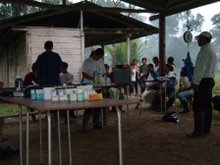
Yesterday I had lunch with my dad, and we got to talking about global health. He's not against aid to Africa; on the contrary, he was the one who accompanied my mom to Kenya last year, when the project was in its incipient stages. But he always seems to ask, "Why not India?" Considering that we are definitely Indian, and speak Indian languages, and eat Indian food, and know Indian culture, and have family there, it's a more than legitimate question. Why Africa?
Until I really got to know all these students and delve into their personal histories and, more importantly, the history of their place of origin (Southern Sudan, specifically Bor Town), this was my question too. I love India. I may not speak the languages my parents do, but something happens to me when I go there, oddly: I feel at home.
Anyway, if it's language we're talking about, why not Mexico? I speak pretty good Spanish and have grown up around Latino culture. Why not the urban poor of San Francisco, for that matter? The needy communities of Santa Ana?
Those are all legitimate questions, no doubt. How did we become all about Southern Sudan?
Sudan is not a cause (if I can momentarily reduce it to that) that we sought out, it's something that just happened. We weren't looking to work in this particular part of the world, necessarily. Most of my global health experience is in Central and South America. And last year I did a project in India.
But there's something about Africa's need that is staggering right now. I know well that the indigenous in Chiapas have suffered unspeakable violence in the highlands--I'm thinking of the 1994 Acteal Massacre that earned the Pillar of Shame. I know that Hindus, Muslims and castes and subcastes (the Gujjars and Meenas, when I was last there) have been at it for centuries.
But right now, I feel that Africa is in a crisis mode we as members of the human race cannot ignore. Particularly, Sudan right now is in crisis. A whole nation is utterly torn apart, and at its heels are Ethiopia and Somalia and Rwanda. The instability is staggering. This extent of civil upheaval, of human cost, is among the greatest of international atrocities. Yes, the Acteal Massacre was horrific. It almost took our breath away to hear Manuelito's account of it (a survivor who lost both parents and several family members, including babies). But what about the 1991 Bor Massacre no one talks about? Yes, the social and political drivers are not comparable. But I'm talking about human suffering and consequent human need. So for me, and for my mom, that is why Africa.
(Banner from the film "Not Lost" on the Lost Boys of Sudan)





No comments:
Post a Comment